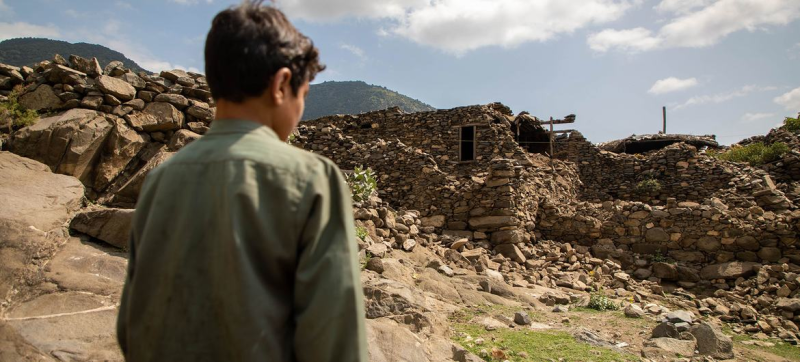- Tough times ahead, everyone must remain united: Tarique Rahman |
- Sirajganj’s luxuriant mustard fields bloom as an oasis of gold |
- Man killed after boat hits sand-laden bulkhead on Padma River |
- Holy Shab-e-Meraj on January 16 |
- 2025: Resilient Economies, Smart Development, and More Jobs |
Afghanistan Quake, Ebola, Climate, and Peacekeeper Crises

In Ghazi Abad village in the Kunar province, a boy stands in front of his home destroyed by the earthquake that hit eastern Afghanistan on 31 August.
The death toll from the Afghanistan earthquake has risen to over 2,200 as UN agencies continue relief efforts while calling for funding to build sturdier housing to withstand future shocks.
Since the initial quake on Sunday in eastern Nangarhar province, landslides and strong aftershocks have disrupted rescue operations.
UNICEF reported that access remains blocked in districts including Chawkay and Nurgal in Kunar province, though authorities are deploying earth-moving machinery to restore routes.
Latest estimates indicate roughly half a million people have been affected—including 263,000 children—while at least 5,000 homes suffered partial or total damage.
UN Habitat noted the earthquake caused massive upheaval in remote areas where recent returnees from Pakistan and Iran were just beginning to settle.
“There are still more earthquakes every day, causing landslides and making access even harder,” said UN Habitat’s Stephanie Loose in Kabul. She highlighted that women and girls are particularly vulnerable due to cultural restrictions and limited access to female medical personnel.
UN Secretary-General António Guterres visited Papua New Guinea, calling the Pacific islands climate change’s “Ground Zero” and urging global support to protect rainforests and ecosystems.
Guterres emphasized that the 1.5°C limit on global temperature rise under the 2015 Paris Agreement remains in jeopardy and urged nations to submit updated climate plans and seize renewable energy opportunities.
Health authorities in the Democratic Republic of the Congo (DRC) declared a new Ebola outbreak in Kasai province, reporting 28 suspected cases and 15 deaths, including four health workers.
The outbreak is concentrated in Bulape and Mweka health zones. Samples tested on 3 September confirmed the Ebola Zaire strain. A national Rapid Response Team, supported by WHO experts, has been deployed with medical supplies, mobile laboratories, and protective equipment.
“Case numbers are likely to rise as transmission continues,” said Dr. Mohamed Janabi, WHO Regional Director for Africa. Vaccines and treatments are being moved to the affected areas to protect frontline workers and contacts.
The UN peacekeeping mission in South Sudan (UNMISS) condemned an attack by a local armed group targeting “blue helmets” in Western Equatoria state. The militants seized a small cache of weapons during a patrol between Tambura and Mapuse.
UN Spokesperson Stéphane Dujarric emphasized that attacks on peacekeepers may constitute war crimes. Meanwhile, widespread flooding affects over 270,000 people across 12 counties in four states, disrupting education, health, water, and nutrition services, and increasing public health risks.

